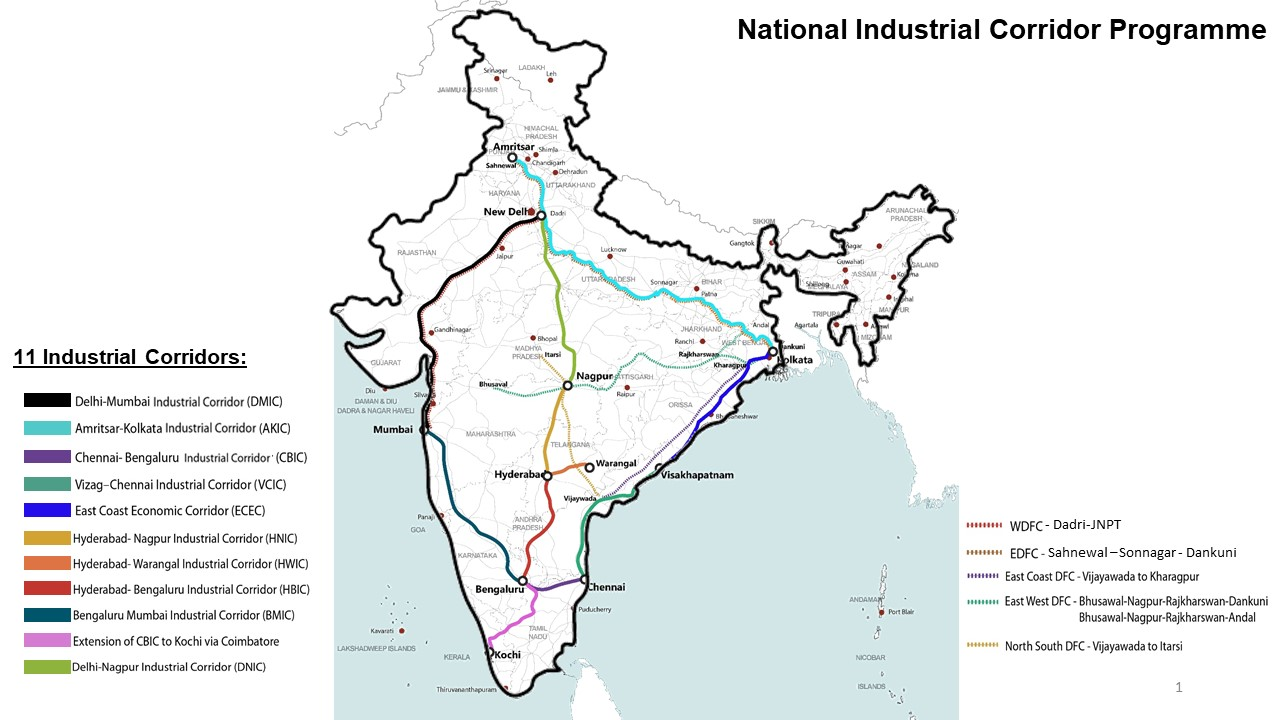
In News
Recently, the information about the Industrial Corridors has been provided in the Lok Sabha.
About the Programme
- The Government of India is developing various Industrial Corridor Projects as part of the National Industrial Corridor Programme.
- Each industrial in the Industrial Corridors is envisaged to be implemented by a Special Purpose Vehicle (SPV) in the form of a company set up under the Companies Act, 2013 as a joint venture between the central and the state governments.
- Aims
- Development of futuristic and greenfield industrial cities in India which can compete with the best manufacturing and investment destinations in the world.
- Creation of employment opportunities and economic growth leading to overall socio-economic development.
- Provide multi-modal connectivity with complete ‘plug and play’ infrastructure till the plot level along with building resilient and sustainable future-ready cities.
- Expansion of industrial output and provide better living and social facilities for the new and growing workforce.
- Enhance India’s competitiveness in manufacturing through the creation of world-class infrastructure and reduced logistics costs.
- Budget: Overall sanctioned corpus of Rs. 20,084 crore.
- Implementing Agency: The National Industrial Corridor Development Corporation Limited (NICDC) is the implementing agency.
- It acts as a knowledge partner to NICDIT in respect of all the Industrial Corridor projects for undertaking various project development activities.
- Monitoring and Review Mechanism:
- The National Industrial Corridor Development and Implementation Trust (NICDIT).
- In 2016, the government approved the expansion of the scope of existing DMIC-Project Implementation Trust Fund (PITF) and re-designated it as NICDIT.
- NICDIT comes under the administrative control of the Department of Promotion of Industry and Internal Trade (DPIIT), Ministry of Commerce and Industry.
- An Apex Monitoring Authority under the chairmanship of the Finance Minister periodically reviews the activities of NICDIT and progress of the projects.
- The National Industrial Corridor Development and Implementation Trust (NICDIT).
- 11 Industrial Corridors Projects are being taken up for development with 32 Projects to be developed in four phases as part of the National Master Plan for providing multimodal connectivity to economic zones up to 2024-25.
- Four Phases:
- Phase 1: Projects approved.
- Phase 2: Projects in advance stage of planning and implementation to be initiated by 2021.
- Phase 3: Projects under development and implementation likely to be initiated by 2023.
- Phase 4: Projects under conceptualization and implementation likely to be initiated by 2024.
- Four Phases:
- 11 Industrial Corridors Projects are under different stages of conceptualization/development/implementation.
- Delhi Mumbai Industrial Corridor (DMIC)
- It is the first industrial corridor which is being implemented in the country wherein substantial progress has been made.
- Chennai Bengaluru Industrial Corridor (CBIC)
- Amritsar Kolkata Industrial Corridor (AKIC)
- East Coast Industrial Corridor (ECIC) with Vizag Chennai Industrial Corridor (VCIC) as Phase 1
- Bengaluru Mumbai Industrial Corridor (BMIC)
- Extension of CBIC to Kochi via Coimbatore
- Hyderabad Nagpur Industrial Corridor (HNIC)
- Hyderabad Warangal Industrial Corridor (HWIC)
- Hyderabad Bengaluru Industrial Corridor (HBIC)
- Odisha Economic Corridor (OEC)
- Delhi Nagpur Industrial Corridor (DNIC)
- Significance
- These are expected to enhance India’s competitiveness in manufacturing through the creation of quality infrastructure ahead of demand.
- These will attract investments in manufacturing and position India as a strong player in the Global Value Chain.
- It also generates employment leading to the socio-economic development of the people of the nation.
- During 2019-20, the total number of employment generated (direct and indirect) is 8,000.

(Image Courtesy: NICDC) |
Previous article
UPSC advertises for Lateral Entry into Central Administration
Next article
National Creche Scheme